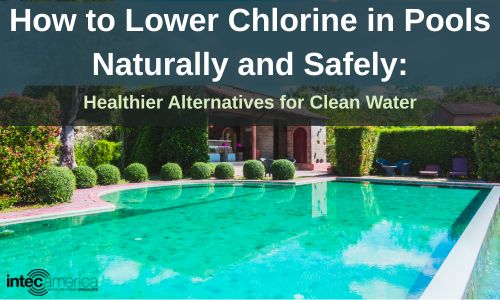If you are a pool owner, you have likely struggled at some point with maintaining safe chlorine levels. While chlorine is effective at sanitizing pool water, overuse can lead to health issues and unpleasant swimming experiences. As more people seek eco-friendly and skin-friendly options, the demand for natural methods to reduce chlorine in pool water is growing. In this blog, we’ll explore how to lower chlorine in pools naturally and safely—without compromising water quality.

Why High Chlorine Levels Are a Concern
Excess chlorine in a pool isn’t just unpleasant—it can be hazardous. Common signs include:
- Eye and skin irritation
- Strong chemical odors
- Fading swimwear
- Respiratory discomfort
Prolonged exposure to high chlorine levels can contribute to hygiene related diseases and even trigger asthma or allergic reactions in sensitive swimmers. Additionally, when chlorine reacts with organic matter, it forms chloramines—byproducts that are harmful to both swimmers and the environment. Understanding the consequences of water related diseases and water pollution related diseases is the first step toward making a change.
Natural Ways to Reduce Chlorine in Pool
Let’s look at trusted, natural ways to lower chlorine levels in a pool:
- Let the Sun Do the Work
UV rays naturally break down chlorine. Simply remove the pool cover and let sunlight help dechlorinate pool water over time.
- Partial Drain and Refill
This straightforward method involves draining part of your pool water and replacing it with fresh water to dilute the chlorine concentration.
- Vitamin C Treatment
Ascorbic acid (Vitamin C) neutralizes chlorine. It’s a fast and safe solution to decrease chlorine in pool environments without adding more chemicals.
- Natural Evaporation
Letting your pool sit for a couple of days without adding more chlorine can lower levels naturally, especially in hot weather.
Healthier Pool Alternatives: Long-Term Solutions
Switching to a healthier sanitation system can be a smart long-term investment.
Copper Ionizers
Copper ionization is a scientifically proven alternative to traditional chlorination. It inactivates bacteria and algae without irritating your eyes or skin. Copper ionizers not only eliminate the need for chlorine but also help maintain healthy pool water with minimal effort. Many pool owners who use copper ionizers report clearer, fresher water with far less maintenance.
Other Alternatives
- Saltwater systems: Gentler on skin and eyes but still produces chlorine which can affect those hypersensitive to chlorine allergies.
- Mineral systems: Use silver and copper for sanitization and still require chlorine but at lower levels. They may offer relief over saltwater generators. Mineral systems are NOT ionizers as they do not release free ions into the water.
Choosing these options extensively improves pool hygiene in swimming and creates a healthy pool experience for everyone.
Know More about Swimming Pool Sanitization
Maintaining Pool Hygiene After Reducing Chlorine
Once you reduce chlorine in your pool, it’s essential to maintain balanced water chemistry for a healthy swimming environment. Key parameters like pH 7.4–7.8, (7.0-7.4 for an ionized pool) and alkalinity 80–120 ppm, (60-80 for an ionized pool) should be regularly monitored.
We recommend using natural balancing agents and relying on a copper ionizer system for long-term sanitation. With consistent testing and proper care, your pool can remain sparkling, safe, and free from harsh chemicals.
Real Pool Owner Advice
Customers who have made the switch to copper ionizers eliminate allergic reactions related to chlorine while reducing maintenance stress, and improved swimming comfort.
One customer shared how their Endless Pool has remained “severe clear” for months since switching to copper ionization—no harsh chemicals, just stable, beautifully clear water with simple pH and copper testing.
Another family reported a remarkable transformation after switching from chemical treatments that caused a severe skin reaction. After installing Intec America’s ionizer, their pool water turned from murky to crystal clear within days, resolving skin issues and restoring the joy of daily swimming.
Conclusion
Whether you are concerned about water pollution related diseases or simply want a more enjoyable swim, learning how to reduce chlorine in pool water naturally is a step toward healthier living. From UV exposure and Vitamin C, to long-term solutions like copper ionizers, there are effective, natural methods that keep your pool clean without the chemical overload.
Create a healthy pool that supports your wellness, the environment, and a great swimming experience.
Explore our range of copper ionizers designed for pools of all sizes—Shop now and make the switch to a healthier, chlorine-free swim!
FAQs
Q.) Can you run a pool without chlorine?
Ans. Yes, you can maintain a healthy pool without chlorine by using alternatives like copper ionization, which naturally inactivates bacteria and algae without the harsh effects of traditional chemicals.
Q.) How long does it take for chlorine to naturally dissipate from a pool?
Ans. Chlorine can naturally dissipate in about 2–4 days with sunlight exposure, but factors like pool size and weather conditions can affect this. A copper ionizer helps maintain cleanliness during this process.
Q.) How can I lower chlorine levels in my pool quickly and safely?
Ans. To dechlorinate your pool fast, you can use neutralizing agents like sodium thiosulfate or let the pool sit uncovered in direct sunlight for 2–3 days. Always test chlorine levels afterward before swimming. Our recommendation is, the sun do its job which does take a little longer but without the use of chemicals. Ask for a support team member if your stabilizer levels are too high.
Q.) Can I switch to a copper ionizer immediately, or do I need to prep my pool first?
Ans. Before switching, it’s important to balance your pool’s chemistry, especially pH and alkalinity, and just stop adding chlorine. Then, you can install the ionizer and begin copper level testing for optimal sanitation. As the chlorine naturally dissipates, the copper levels will rise for a smooth transition and no down time.
Recent Blog Posts
- https://www.intec-america.com/blog/how-safe-is-your-pool-tips-for-preventing-waterborne-illnesses/
- https://www.intec-america.com/blog/is-it-time-for-pool-remodeling-recognize-the-signs-explore-solutions/
- https://www.intec-america.com/blog/how-hard-water-affects-your-pool-and-what-to-do-about-it/
- https://www.intec-america.com/blog/tips-to-avoid-costly-pool-maintenance-mistakes/
- https://www.intec-america.com/blog/pool-closing-checklist-everything-you-need-to-know/
- https://www.intec-america.com/blog/eco-friendly-pool-care-with-non-toxic-solutions/
- https://www.intec-america.com/blog/why-keeping-your-pool-alkalinity-balanced-is-crucial/


